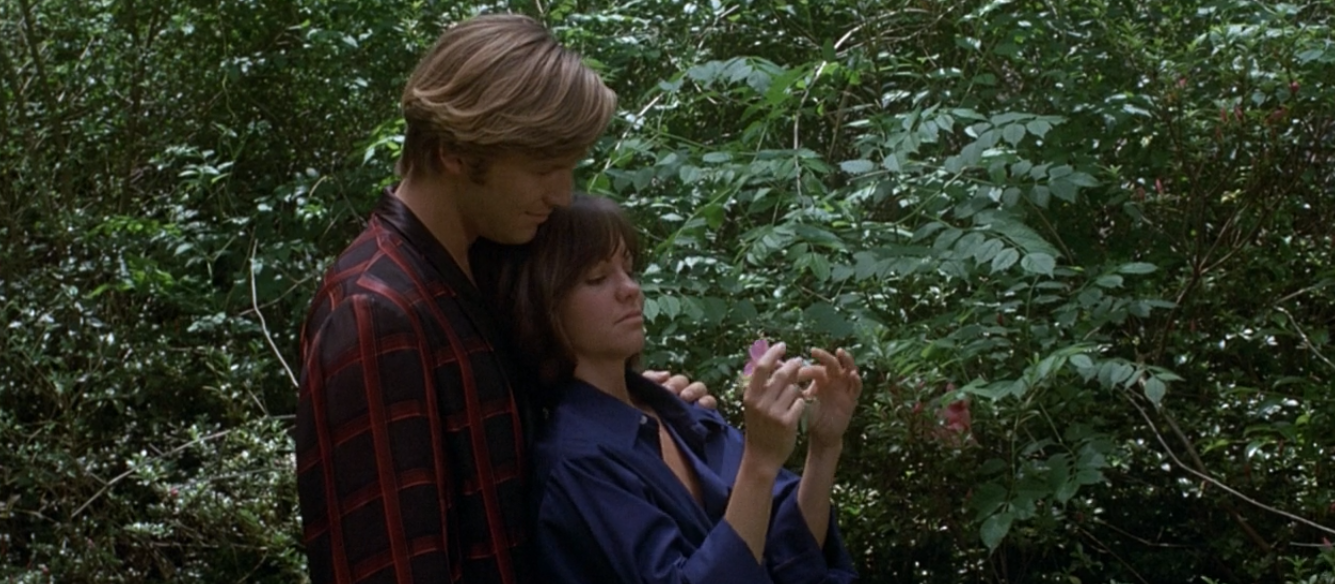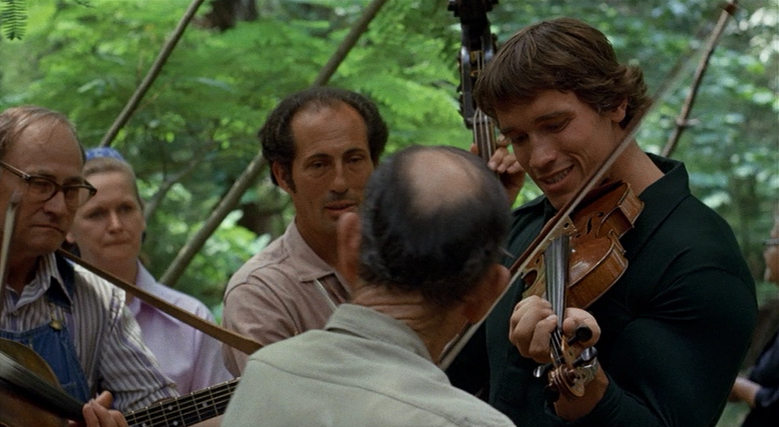

“Now the point is that to make anything meaningful out of a life, it really doesn’t matter what you do. Only that you do something, and do it unsparingly.”
Bob Rafelson’s Stay Hungry flirts with the possibility of a rich character study along the lines of the director’s earlier masterpiece, Five Easy Pieces. The analog of Jack Nicholson’s Bobby Dupea is Craig Blake (Jeff Bridges), the recently-orphaned scion of a wealthy Alabama family who finds himself existentially floundering. He seeks fulfillment in his hobbies, as evidenced by a mantle decorated with trophies from his hunting and fishing expeditions, but does not find it there. His upper class social circle offers him nothing but empty flirtations and country club tennis matches. Neither does he find meaning in his lackluster work at a real estate investment firm, and the implorations from Uncle Albert (Woodrow Parfrey) to join him in the steel business betrays less a concern for his nephew’s wellbeing than a desire to keep up the family’s old money appearance. It’s only when his shady boss (Joe Spinell) sends him to buy out a rinky-dink gym—that they intend to raze to clear room for a skyscraper—that Craig discovers a new zest for life and a potential cure for his disillusionment.
It’s at this ragged old gym that Craig first encounters the mysterious Joe Santo (Arnold Schwarzenegger), a charismatic bodybuilder training to compete in the upcoming Mr. Olympia competition. He’s also, amazingly, impossibly, a talented fiddle player who belongs to a hillbilly bluegrass ensemble. It’s impossible to overstate how impressive Schwarzenegger is here. Not yet the walking caricature that he would become, not yet even the star of Pumping Iron, he seems totally in his element as a foreign athlete overcoming his insecurities by honing his body. He’s a loyal friend and willing to share his hard-earned wisdom with whoever cares to get to know him. There’s vulnerability and humanity and depth to his character that he was seldom given a chance to display in the ensuing years.
In addition to Joe, Craig finds himself warming to the many other colorful misfits that hang around the gym: the irascible, toupeed proprietor/trainer Thor (R. G. Ballard), Joe’s affable “grease man” Franklin (Robert Englund), the ladies’ karate instructor Anita (Helena Kallianiotes), the awkward masseuse Newton (Roger E. Mosley), and, of course, the lively secretary Mary Tate (Sally Field), who proves romantically irresistible to him. Craig’s first introduction to many of these characters comes when he accidentally intrudes on a bizarre late night training session in which Joe dons a chintzy superhero costume for the duration of his workout while the others pound out primitive rhythms on a hand drum and chant encouragements. It’s no surprise that he finds it more enjoyable to hang out with this eccentric company than mope around his mansion with only the longtime family butler (Scatman Crothers) for company, or idly gamble and eat club sandwiches with his bland rich friends (John David Carson, Ed Begley Jr.).

After the film establishes this ripe scenario, however, it veers erratically, favoring eclectic idiosyncrasy over a compelling throughline as Craig finds himself enjoying life for the first time since his parents’ tragic deaths. He bounces around pool halls, hits the river for some tandem waterskiing, pounds moonshine at a backwoods hoedown then drunkenly flatfoots to the crowd’s great pleasure, works out with the fiddle-playing Austrian strongman, impulsively steals a painting from an office building that Mary Tate spots through a window. A wonderful momentum develops as John Fink’s scissors take us in and out of distinctive miniature vignettes without a moment to catch our breath. Even the interstitial sequences are full of memorable little oddities: Thor forcibly hoists Craig over his shoulder to crack his back the very first time they meet; Craig eats a carrot like a maniac because it is apparently good for jaw health, even as his business partner (Richard Gilliland) ridicules him for his lack of progress on buying out the gym (he’s also cradling a rifle while he munches); Craig and Mary Tate play dress up with family heirlooms and lapse into a comical imitation of marionettes; William lays claim to a suit of armor when he decides to resign from his butlership; Uncle Albert keeps dropping a conversation to spy at squirrels with a viewfinder.
I don’t like being comfortable. Once you get used to it, it’s hard to give up. I’d rather stay hungry.
However exquisite these quirks may be, they don’t entirely justify the film’s tendency to lurch, nor do they completely make up for its half-forgotten plot. Indeed, as Craig indulges in all manner of freewheeling excursions with his new pals, the film loses focus on its story, even though many of its individual sequences and the characters populating them are delightfully memorable. It really pains me to belabor the point, because Stay Hungry is fully defined by its three dimensional characters and their milieu, but with a little bit more structure it would have been golden.
In amongst the exuberant outings there are a few dark turns, such as a disastrous country club shindig that Craig and Mary Tate attend together. Joe’s bluegrass troupe has been invited to perform and everyone is all dressed up and looking forward to a good time. But the down-to-earth country folk simply don’t fit in with the snobbish crowd, which causes no small amount of friction between the new lovers.

But none of what comes before the climax will prepare you for it. It goes weirder, nastier, and more comical than any of the preceding material as the looming real estate developers try to strong arm Thor into selling his gym. They have the building covertly ransacked and then successfully ply the aging owner with hard drugs and hookers, leading to a marathon of debauchery within the confines of the Olympic Spa that viciously escalates when Mary Tate accidentally stumbles upon her drug-addled and sexually aggressive employer the next morning. Meanwhile, the Mr. Olympia competition has concluded, and when Thor doesn’t show up with the prize money, the entire gang of hulking speedo-clad beefcakes take to the streets of Birmingham to the amazement of the local townspeople. This is madcap stuff that’s hard to reconcile with the preceding hour and twenty minutes of the film. Film buffs like to point out Coppola’s crosscutting of an infant baptism and orchestrated murders in The Godfather, but what do you do with five hunky dudes posing half naked atop a city bus juxtaposed with a fragile woman being raped by a slimy sixty year old man sans toupee?
If Stay Hungry doesn’t quite match the stature of Five Easy Pieces due to its jagged tonal shifts, I’d argue that it still deserves to be mentioned alongside it. It replicates the free-flowing sense of spontaneity, is marked by spirited nonconformity and memorable affectations, features a glut of multidimensional characters ably embodied by a talented cast, and, though I’ve not seen them all, contains what might be Arnold Schwarzenegger’s finest performance. It’s just a reality that second-tier New Hollywood films trump the best offerings of most other eras.